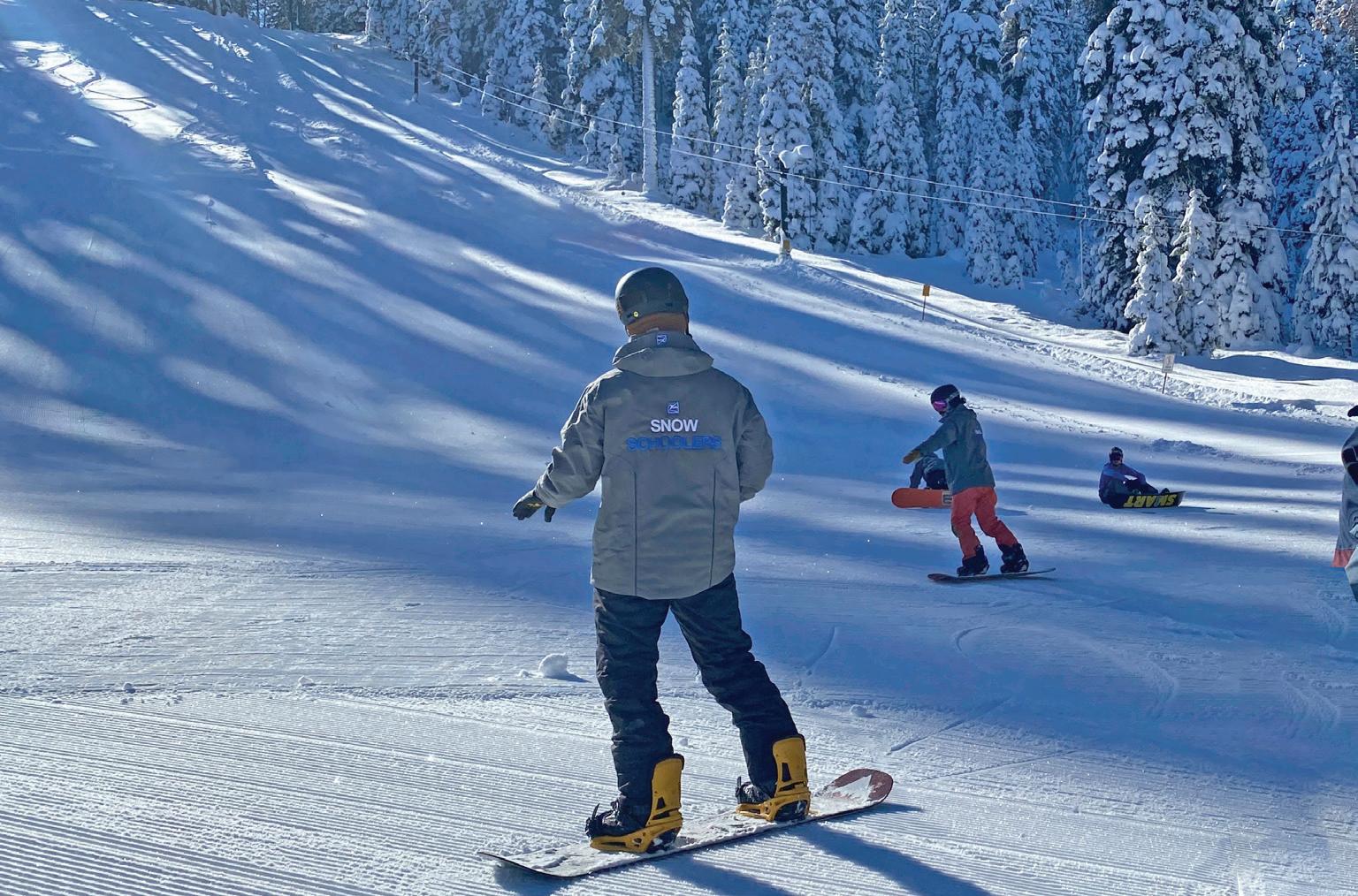
5 minute read
How UNR’s Ozmen Center facilitates entrepreneurship
from March 2023


Advertisement
This month, we’re going to expound on the entrepreneurial-ecosystem overview from last month. My colleague, friend and fellow world-traveler Dr. Mehmet Tosun, the director of the Ozmen Center for Entrepreneurship at the University of Nevada, Reno, College of Business, will delve into how the Ozmen Center and its rich startup programs add to the Nevada economy. Please understand that when a student or faculty member starts a business in Nevada, they almost always stay in Nevada. That is a really big deal! —Matt
Westfield
Thanks to the Reno News & Review and Matt Westfield for running a column related to entrepreneurship in our community. This is a great idea, and I’m sure this column will help the business community in months and years to come.
I’d like to build on what Matt said last month by bringing attention to a specific group in our ecosystem—the Ozmen Center for Entrepreneurship. The Ozmen Center was founded in 2014 after a generous donation from Eren and Fatih Ozmen, the owners of the Sierra Nevada Corporation. As successful entrepreneurs and alumni of our university, the Ozmens understand the importance of support- ing entrepreneurship in a university environment. Since the Ozmen Center’s inception, we’ve had a cadre of individuals who’ve provided great leadership—Chris Howard, Kylie Rowe, Liset Puentes and, more recently, Dick Bartholet and Matt Westfield. They’ve all made an impact and brought the center to where it is today. Of course, let’s not forget Dean Greg Mosier (with his broader vision for the College of Business), administrative staff in the dean’s office, and many faculty and students who have played a considerable role in the center’s success.
Our center’s vision is to help students and faculty in our university and Northern Nevada community with entrepreneurial capacity-building and startup ideation. As we note on our website, we provide “an idea space that facilitates entrepreneurship.” We engage our community in different ways. Students and faculty can approach us for help with their business ideas. While we are located in the College of Business, we serve all students and faculty in the university.
We have an important teaching mission. The College of Business offers a minor and an MBA with an emphasis in entrepreneurship. Entrepreneurship is one of the most popular minors among business students. It is also very popular with non-business majors. About 18 nonbusiness majors in the university have students who minor in entrepreneurship. Ozmen Center faculty and staff help with this mission by teaching classes, advising students and providing mentorship.
How do we help student entrepreneurs beyond classroom teaching? We make good use of student competitions. I am sure many people know about the Sontag Entrepreneurship Competition that started in 2012. After more than 10 years, it’s clear that Sontag has been a signature program, not just for the Ozmen Center, but also for the entire university community. There is always an impressive group of entrepreneurs who help the program as judges in different stages of the competition.
In 2021, we started a new program called LaunchNevada, which was designed to help students prepare for the Sontag competition. Those students who participate in LaunchNevada submit a basic business plan and receive feedback from us, with a $500 award. The program also includes networking events with inspirational talks by successful entrepreneurs in our community, information about entrepreneurship resources in the university, student presentations and social mixers. This program has already become popular among students from different colleges and backgrounds.
Students can also learn a great deal by attending our Creating a Business Workshop Series. Not only can students attend these workshops for free; they can also find video recordings of past workshops on our website. The community can view these for free, too!
We are thinking globally in the Ozmen Center. Our center has been expanding “internationally” in recent years. In addition to my role as the Ozmen Center director, I am also the director of the International Business Programs in our college. As we have expanded our college’s portfolio of international partners around the world, we have also connected the Ozmen Center to similar entrepreneurship centers in other countries. That’s brought the benefit of interacting with faculty, students and entrepreneurs from those countries, and learning from different ecosystems. We have built particularly strong connections with our partners, SGH Warsaw School of Economics in Poland, and Koc University in Istanbul. We have many ongoing international projects in the college, some of which include entrepreneurship-related collaborations. We involve our faculty and students in our international activities as much as possible, including study-abroad trips. We also work with our college and the Northern Nevada International Center to host the Mandela Washington Fellows, who visit our campus from a variety of African countries. Many of the fellows are also entrepreneurs.
We have many more initiatives and events planned in the future. One I would like to mention in particular is the International Women’s Entrepreneurship Symposium (IWES). After a hiatus due to pandemic, we are bringing it back this year, with symposium events scheduled for Tuesday and Wednesday, March 7 and 8. This year’s IWES will include a leadership seminar by Laura Jackson, music director and conductor of the Reno Philharmonic Orchestra, and four inspirational speakers.
In a recent workforce-development study I worked on jointly with Prof. Tom Harris, from the University Center for Economic Development, and a team of researchers, we prepared a list of all the workforce assets, including those related to entrepreneurship—giving us an asset map for entrepreneurship in Nevada. Our entrepreneurial-asset categories include university entrepreneurship programs, research centers and labs, technology parks, business incubators, accelerator programs, venture capital, angel investors, commercial banks, chambers of commerce, and a variety of government agencies, economic development support groups and philanthropic organizations. Universities play a big role in this workforce asset map—and entrepreneurship is critical to future workforce. That makes our Ozmen Center an integral part of the entrepreneurial ecosystem and the workforce development in our university and community.
Feel free to contact me at tosun@unr.edu.




UPFRONT Court rules BLM broke law in approving lithium mine
A federal judge in Reno has ruled that the Bureau of Land Management violated U.S. environmental law when it approved Lithium Nevada’s plan to bury 1,300 acres of public lands under waste rock.
Judge Miranda Du in February ordered the BLM to determine whether the company had valid existing rights under the 1872 Mining Law to occupy the waste-dump lands. She ruled that the BLM violated the Federal Lands Policy and Management Act by assuming mining claim rights without evidence—a fundamental part of the case brought by environmental-justice and conservation groups, ranchers and Nevada Indigenous tribes.
The mining company said it can remedy the permit problem and get the $1.6 billion project back on track. The proposed open-pit mine is located 53 miles northeast of Winnemucca.
Under a federal law passed in 1872, mining companies are given wide latitude to extract minerals from federal lands and have been considered exempt from some environmental-assessment requirements. But a federal court’s decision in an unrelated case in 2022, found that mining companies do not necessarily have the right to use federal land not containing valuable minerals.
The federal agency and the mining corporation now have to prove that the lands to be buried contain valuable minerals. Judge Du denied other plaintiffs’ claims that the company and BLM failed to conduct proper environmental investigations or do the required consultation with tribes.
Spokesmen for the environmental justice/conservation groups said their lawyers are analyzing the court’s decision and may appeal the court’s rejections of their other claims.
“We don’t know yet what the next steps will be, but we know we won’t stop fighting this destructive mine,” said Greta Anderson, deputy director of Western Watersheds Project. “We need to find truly just and sustainable solutions for the climate crisis and not (solve it) by digging ourselves deeper into the biodiversity crisis.”
—Frank X. Mullen










